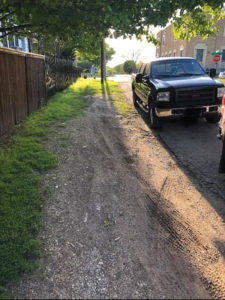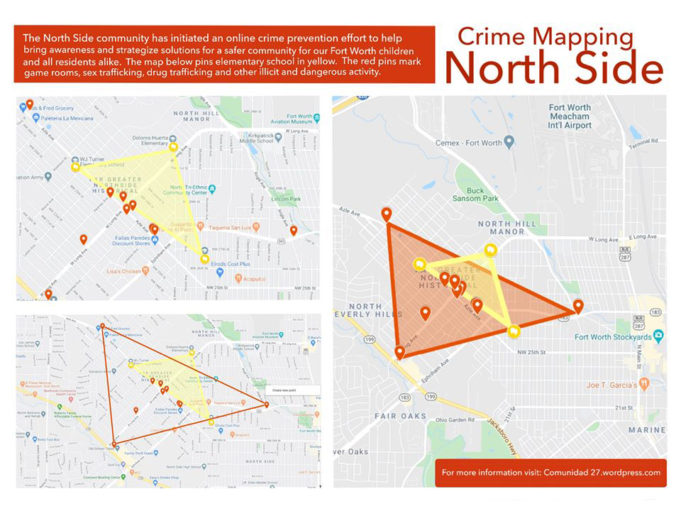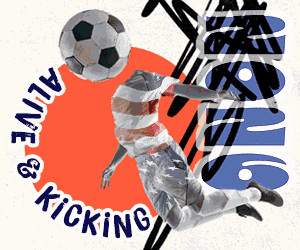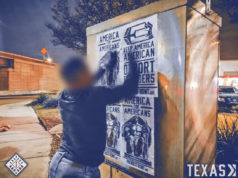Much of Fort Worth’s North Side is struggling, but the tight-knit, predominantly Hispanic community is banding together in new ways, according to two longtime Northside residents.
Esmeralda Morales said the retail shop Not Just Soccer (her main source of income) closed under the shelter-in-place order. With modest savings, help from relatives, and occasional sales of custom woodcrafts through her personal business, H&E Wood Customs (@hande_woodcustoms), Morales said she and her family are able to scrape by. Drives past area pantry lines show that many families are not as fortunate, she said.
“Some people are going to every church that offers food pantries,” she said. Those churches are “offering essential items. We don’t hear a lot of people asking for [help publically]. It might be due to a sense of pride. We do see packed drive-through lines at Victory Church. It’s unreal how many people need help right now. We see a lot of those vehicles go back to our area.”
As Morales and community organizer Arnoldo Hurtado told me, the realities of being working class and Hispanic place extra burdens and stresses that leave many Northside residents choosing between safety and feeding their family during the COVID-19 pandemic.
As recently reported in Vice, just 16.2 percent of Hispanic workers are able to work from home, compared to 30 percent of whites and 37 percent of Asian Americans. The “telework disparity” is just another example of how economic downturns disproportionately hurt minority communities, the article said.
For the North Side’s undocumented community, talk of federal stimulus checks is meaningless, Morales said. To fill the economic shortfall, Northside residents have taken to checking in with neighbors, Morales said.
“I’ve always been proud of how our community comes together in a time of need,” she said. “People are asking, ‘Are you doing OK? Do you need baby essentials?’ It has been a blessing in our neighborhood. Sometimes, they are helping complete strangers.”
The Facebook group Northside Community was created by Hurtado a few years ago and now serves as a hub for voicing concerns and offering advice during the shelter-in-place order. Morales recently posted a picture of her car. Her neighborhood does not have elevated street curbs, and the gravel that separates the street from private properties can make discerning property lines unclear. A Fort Worth police officer recently cited Morales’ truck for being parked on her front yard.

Courtesy of Esmeralda Morales
“I was already stressed out that day,” Morales recalled. “I had just rushed to the bank to deposit some money. We are a corner home. We put our vehicles where we can see them, or they will get hit. We don’t have a designated driveway. People are out of jobs, us included. We thought we should have been given a warning. If we contest it, we will have to leave our home to go to court” and risk becoming ill.
The post garnered dozens of supportive comments. Mistrust of police is high in her neighborhood for a variety of reasons, Morales said. Soon after the viral Facebook post, a community officer from the Fort Worth police department stopped by to discuss the matter with Morales. The officer was sympathetic to Morales’ grievances and said he would bring up the issue with Fort Worth City Council and police leadership.
Both Morales and Hurtado agreed that policing should be focused on more serious crimes like human trafficking and gang-related violence. Hurtado continues to map out criminal hotspots, even though he’s currently stranded in Spain. The founder of the grassroots group Comunidad 27 said via email that the “North Side was already suffering from negligence, predatory behavior, and organized crime as far” back as he could remember, but “Northside people are resilient, and, over the last several years, people have been demonstrating that we are ready for change, and we are putting in the work.”
The Facebook group has taken on new importance due to the COVID-19 pandemic, he added.
“With more people relying on the internet to read, connect, and stay informed and engaged, the audience of this group and people’s attention has increased,” he wrote. “There are posts about preventive measures, such as the types of masks to wear to protect yourself and a loved one from COVID-19.
“Someone posted a link that shows a simulation of how droplets spread when someone coughs in a supermarket,” Hurtado continued. “There are posts from local institutions like the North-Tri-Ethnic Community Center announcing activities to look forward to once we are all able to move around freely. A huge transition has been made to online activity for information, communication, work, entertainment, classes, and hanging out with friends.”
The Facebook group is not simply an online forum for chatting. As the group administrator, Hurtado steers conversations toward solutions. Off-the-grid game rooms are sprouting up in homes, Northside residents have told Hurtado. Game rooms offer casino-themed machines and are legal in Fort Worth when city and county ordinances are followed. Critics of the rooms say that they attract organized criminal behavior. Using information gathered from Northside residents, Hurtado, an artist by profession, has created maps that detail the locations of potentially illegal game rooms.
That data is being added to known human trafficking drop-off spots and areas with high concentrations of drug dealers.
“This is where we formulate a plan using existing successful community crime prevention models, such as community cultural programming, strategic block parties (National Night Out), and more strategic revitalization efforts to bring attention to and crash game room parties,” he said. “These crime hubs hate attention, and they thrive on lack of healthy street activity and community engagement.”
The Northside community has banded together during the ongoing health and economic crisis, Hurtado said. The shelter-in-place order has hit many area families particularly hard because they do not have savings.
“If we stay inside, we starve because there is no food, due to lack of money,” he said. “We’ve learned that it has to be we the people who stop relying on the big messy political and institutional departments who are only looking out for themselves and their interests (money).”
Morales said many families in her neighborhood are not in the best situation, financially speaking, but they are doing what they can to help others in any way they can.
How long the Northside community can hold out under the current economic restraints?
“I’m sure people will start breaking down because depression rates have gone up,” she said. “Maybe we could make it through the summer. For us, it has been a challenge, but we have a support system. Many people are in a worse-off financial situation.”












